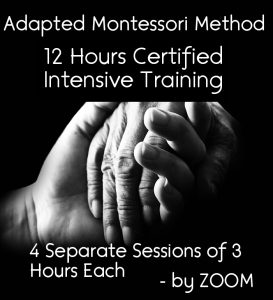
Dementia Training Using the Adapted Montessori Approach
– the integration of Montessori methods into dementia care, and dementia training, represents a pioneering approach to enhancing the quality of life for individuals living with dementia. This approach leverages principles originally designed for educational settings, particularly for children, and adapts them to the needs of adults experiencing cognitive decline.
The core philosophy of Montessori, which emphasizes independence, freedom within limits, and respect for the individual’s psychological, physical, and social development, aligns remarkably well with the goals of progressive dementia care.
Background on Montessori Methods:
Developed by Dr. Maria Montessori in the early 20th century, the Montessori Method is an educational approach that focuses on fostering a supportive learning environment. It encourages self-directed activity, hands-on learning, and collaborative play. In the context of children’s education, it aims to develop independence, self-esteem, and a love of learning. When applied to dementia care, these principles are tailored to respect the adults’ dignity and capabilities while addressing the unique challenges of memory loss and cognitive impairments.
Application in Dementia Care:
Adapting Montessori methods for dementia involves creating structured environments where individuals can engage in meaningful activities tailored to their abilities and interests. The goal is to promote cognitive engagement, social interaction, and a sense of purpose.
Here are key aspects of this approach:
Individualized Activities: Activities are designed to match the individual’s interests, history, and capabilities, ensuring they are both engaging and achievable. This could range from simple tasks like folding clothes to more complex puzzles, gardening, or cooking activities, depending on the person’s abilities.
Prepared Environment: The environment is set up to encourage independence and participation. This means making tools and materials easily accessible, using clear and simple signage, and ensuring the space is safe and welcoming.
Role of the Caregiver: Caregivers act as guides rather than instructors. They facilitate activities by setting up the environment for success and offering support only when necessary. This empowers individuals with dementia to use their remaining skills and promotes a sense of accomplishment.
Emphasis on Respect and Dignity: Recognizing the individual’s right to be involved in decisions about their care and daily activities is paramount. This respect for the individual’s choices and preferences is a cornerstone of the Montessori approach.
Benefits:
Research and practice have shown that when caregivers get dementia training using Montessori methods it leads to significant benefits, including:
Increased Engagement: Individuals participate more actively in activities, leading to improved mood and reduced agitation.
Enhanced Social Interaction: Group activities encourage socialization, helping reduce feelings of isolation and loneliness.
Preservation of Function: Engaging in meaningful tasks can help maintain motor skills and cognitive function for longer periods.
Improved Quality of Life: Overall, the approach contributes to a higher quality of life by providing a sense of purpose and achievement.
The Montessori method for dementia is a testament to the adaptability and enduring relevance of Dr. Maria Montessori’s educational principles. By focusing on the individual’s strengths and providing an environment conducive to engagement and independence, this approach offers a dignified and effective way to care for those living with dementia.
As more caregivers receive dementia training in the adapted Montessori approach and as the method gains more recognition and implementation in care settings worldwide, it holds the promise of transforming the landscape of dementia care, making it more humane, respectful, and empowering for all involved.

Learn more about the 12-Hour Certified Training in the Adapted Montessori Method for the Cognitively Impaired – for groups from the same residence or organization, and for individuals.
The Montessori Alzheimer Center is the authorized training partner for the Center for Applied Research in Dementia.




